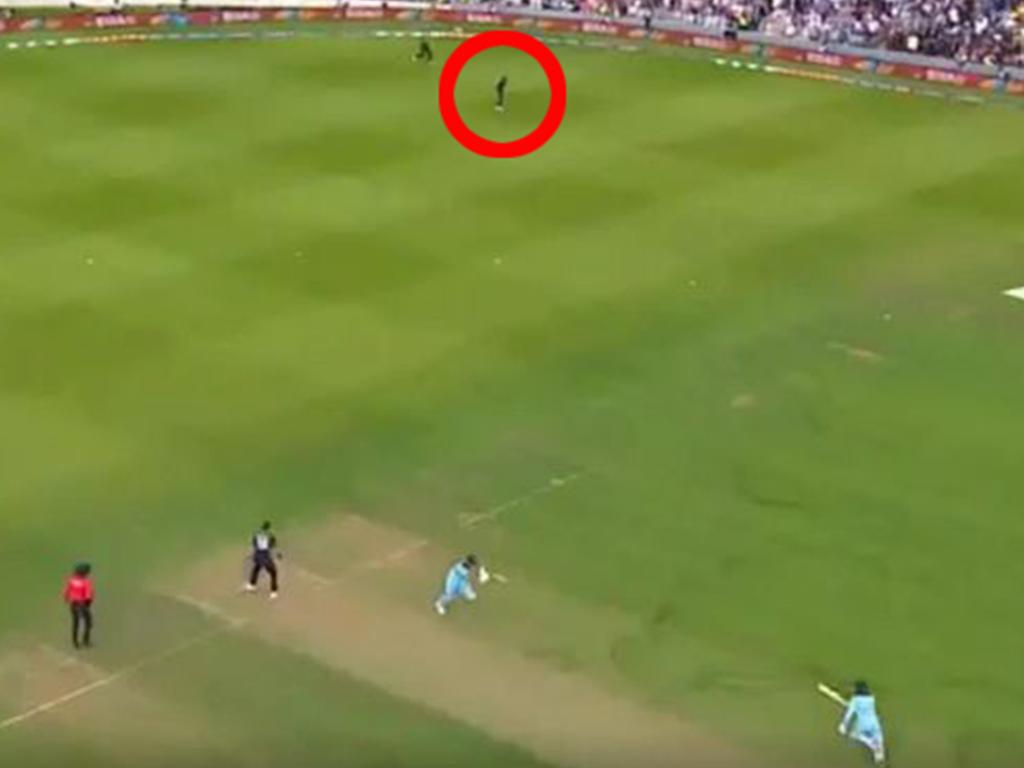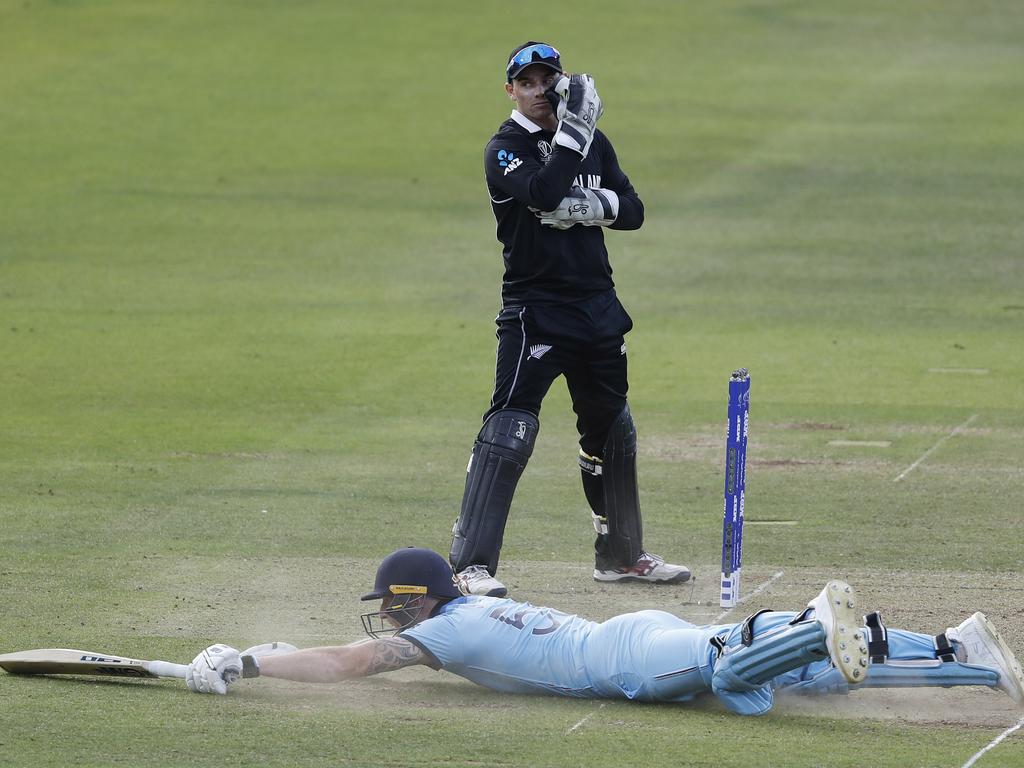England reacts to World Cup controversy as Aussie umpire claims officials got crucial call wrong
An Aussie umpire says the officials got it wrong as England won the World Cup — and this photograph is all the evidence needed.
England’s director of cricket Ashley Giles has dismissed concerns the new world champions were incorrectly awarded an extra run in their incredible final against New Zealand as a former umpire revealed the Kiwis were dudded.
Six runs were added to England’s total on the third-last ball of its innings (before the super over) when a throw from the outfield hit Ben Stokes’ bat and deflected to the boundary for four overthrows as he completed a second run.

However, Stokes had not crossed with his batting partner Adil Rashid when Martin Guptill threw the ball. Law 19.8 claims the second run in progress should not have counted because the boundary resulted from a throw that had already been fired into the keeper before Stokes and Rashid crossed.
That means England should have been awarded five runs, not six.
RELATED: Furore over Cup controversy
Giles wasn’t too bothered when asked if the controversial incident mattered to him. “Not really,” he said, as reported by the BBC. “You could argue the last ball that (Trent) Boult bowled was a full toss on leg stump and if Stokes hadn't just been looking for two he probably would've banged it out of the ground anyway.
“We are world champions, we have got the trophy and we intend to keep it.”
Giles failed to note Rashid, and not Stokes, would have been left on strike for the fifth ball of the over if the correct call had been made.
Former top Australian umpire Simon Taufel was adamant umpires Marais Erasmus and Kumar Dharmasena made a blue.
“There was a judgment error on the overthrow," he told The Age. “The judgment error was the timing of when the fielder threw the ball. The act of the overthrow starts when the fielder releases the ball. That's the act. It becomes an overthrow from the instant of the throw.”
Taufel, who stood in the 2011 World Cup final, knows just how many things the umpires had to consider with every ball.
“In this particular case, the umpires have got a lot on their plate, because like every ball, they've had to watch the batsmen complete the first run, they've had to watch the ball being fielded, to understand how it's in play, whether the fielder's done the right thing,” he said.
“Then they've got to look to see when the ball is released, in case there is an overthrow. And that happens every delivery of the game. And then they've got to go back to see where the two batsmen are.
“They've then got to follow on and see what happens after that, whether there is a run-out, whether there's an ‘obstructing the field’, whether the ball is taken fairly. There's multitudes of decisions to be taken off the one delivery. What's unfortunate is that people think that umpiring is just about outs and not outs. They forget we make thousands of decisions every match.”

Taufel said: “It's unfortunate that there was a judgment error on the timing of the release of the ball and where the batsmen were.
“They did not cross on their second run, at the instant of the throw. So given that scenario, five runs should have been the correct allocation of runs, and Ben Stokes should have been at the nonstriker's end for the next delivery.”
Taufel said it's unfair to say the World Cup was decided by that one event. “There's a lot of ‘what ifs’ and ‘what should bes’ and ‘what could bes’ that happen off those 600-plus deliveries. That's the nature of sport,” he said.
While the debate about the nature of England’s game-changing six runs won’t change the result, bitterness about the countback method used to determine the winner rages on.
What a game of cricket yesterday. Congrats to both teams for putting on a terrific show - full of skill, drama and courage. Feel for NZ as they were outstanding. Well done England. I just wish there was another super over or as many super overs as required to have a clear winner
— Shane Warne (@ShaneWarne) July 15, 2019
As both teams finished tied at the end of their super overs, England was crowned the victor because it hit more boundaries in the match than the Black Caps. Plenty in the cricket world hit out at the bizarre system and New Zealand greats maintained the rage.
According to Stuff, former Kiwi fast bowler Dion Nash said: “I feel really empty, and a bit cheated. Clearly, it's ridiculous … really absurd. The real measure that was used for generations was least amount of wickets lost. So why have we changed that?”
Ex-New Zealand captain Jeremy Coney wanted to see the teams share the trophy at the end of the nailbiting affair.
“It sounds a bit weird, but when you've got two teams that can't be separated after all that, I find that a wee bit galling,” Coney told Radio Sport.
“I don't know how you can then go into arbitrary reasons to sort that out.
“Why you should choose boundaries — batsmen and not bowlers. Not most wickets taken, not dot balls — a dot ball is just as important as a boundary in a way.
“In the end, to separate the two teams was a bit unsatisfactory in those terms.”
With NZ Herald




